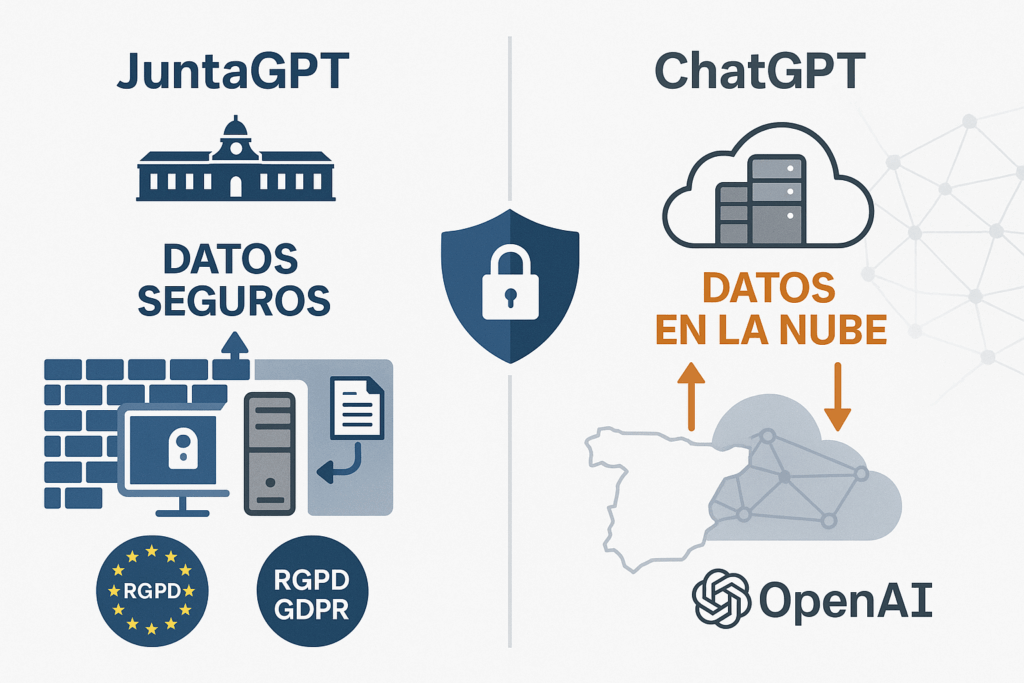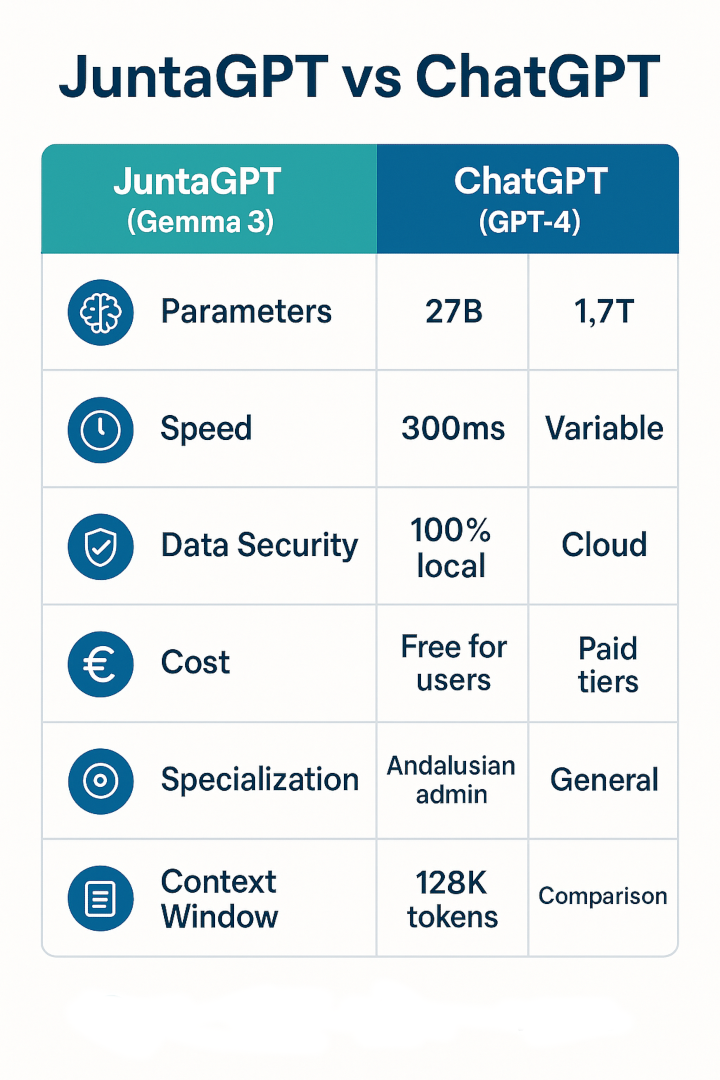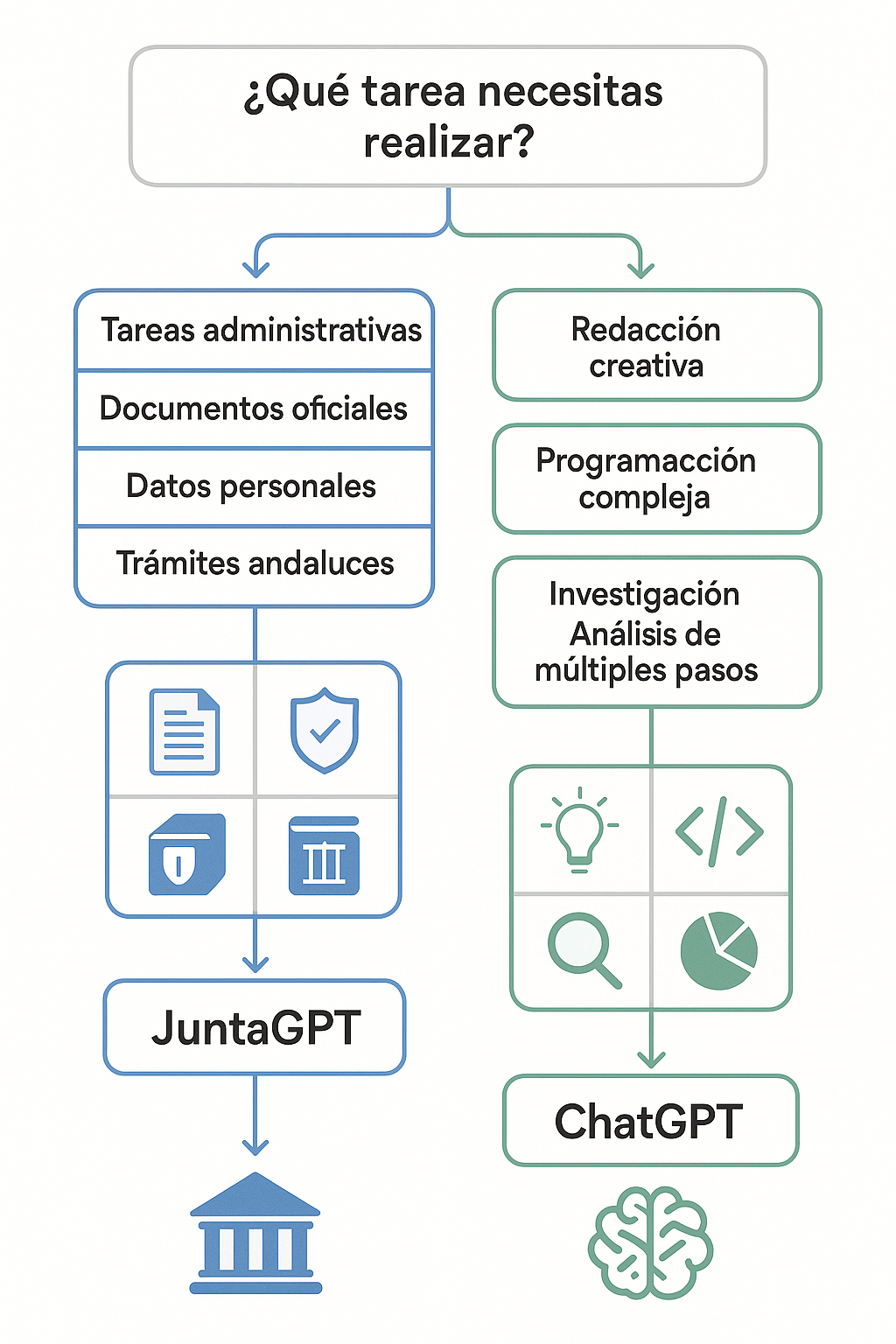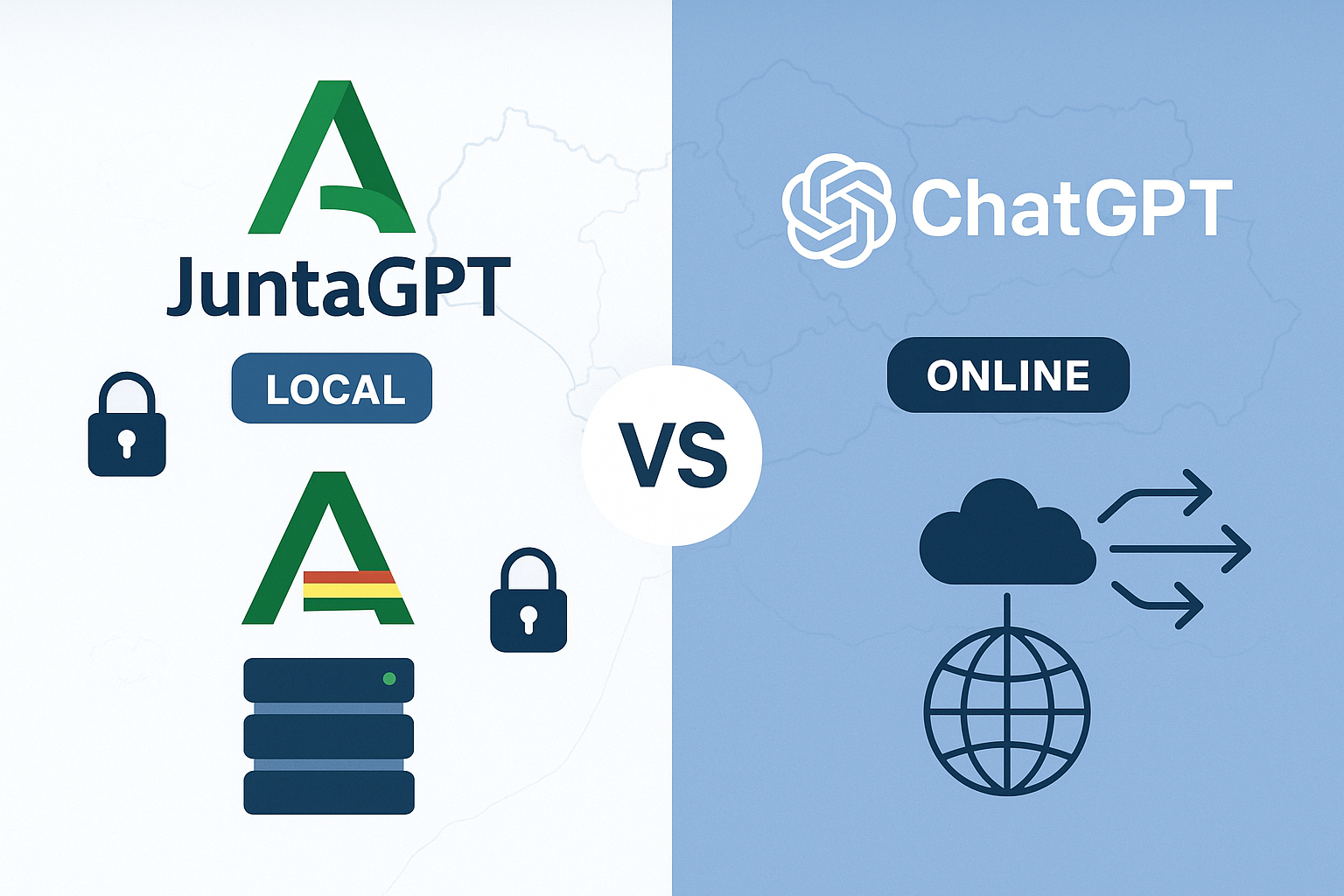What is JuntaGPT and how is it different from ChatGPT?
The Junta de Andalucía has just become a pioneer in Spain by launching JuntaGPT, its own artificial intelligence assistant for the 240,000 civil servants of the Andalusian administration. But why create your own AI when ChatGPT already exists? Is it really worth the effort and investment? We explain the key differences and the reasons behind this strategic decision.
The fundamental difference: Security and data sovereignty
JuntaGPT works completely offline, without connection to external services. This means that all the information you enter remains within the Junta de Andalucía network and never goes outside. In contrast, when you use ChatGPT, your data travels to OpenAI’s servers in the United States (in most cases).
For a civil servant who handles files, personal data of citizens or sensitive information of the administration, this difference is crucial. With JuntaGPT you can:
- Upload official documents without risk of leakage
- Processing personal data in compliance with the GDPR
- Working with classified information while maintaining confidentiality

Different technology, different purpose
While ChatGPT uses OpenAI’s GPT technology, JuntaGPT is based on Gemma 3 (27 billion parameters), an open model from Google. This choice is not accidental and deserves a detailed explanation.
What is Gemma 3 and why did the Board choose it?
Gemma 3, launched in March 2025, belongs to Google’s Gemini family but with one crucial difference: it is completely open and free.[1]. While Gemini (Google’s ChatGPT) is a closed commercial service, Gemma 3 allows any organization to download, modify and run it on their own servers.
Why Gemma 3 and not another open model?
The Digital Agency of Andalusia (ADA) chose Gemma 3 for very specific reasons:
- Exceptional energy efficiency:
Gemma 3 can run on a single GPU or TPU, making it much more efficient than equivalent models. This means lower operating costs and lower environmental impact. - Competitive performance:
Despite having “only” 27 billion parameters (vs. an estimated 1.7 trillion for GPT-4), Gemma 3 offers comparable performance to much larger models on specific tasks.[2]. - Large context window:
Gemma 3 can process up to 128,000 tokens in a single conversation, allowing large documents to be analyzed at once. - Multimodal capabilities:
In addition to text, it can process images and short videos, useful for analyzing documentation with graphics or scanned forms. - Native multilingual support:
Comprises more than 140 languages, with native support for 35 languages without additional training, obviously including Spanish.[3].

The big question: How has Gemma 3 been adapted?
Here we come to one of the most important and, paradoxically, least clear aspects of JuntaGPT. The Digital Agency of Andalusia has not publicly disclosed the technical details of how they have adapted Gemma 3 to create JuntaGPT. This raises important questions:
Fine-tuning of the model?
We do not know if they have fine-tuned Gemma 3 with data specific to the Andalusian administration. The fine-tuning would involve:
- Train the model with official documents, procedures and Andalusian regulations.
- Modify neural weights to specialize in administrative terminology
- Significantly improve your domain-specific knowledge
If they have done fine-tuning, JuntaGPT would be substantially more accurate in Andalusian administrative tasks than the general Gemma 3 benchmarks suggest.
A RAG (Retrieval-Augmented Generation) system?
Alternatively, they could have implemented a RAG system, which would keep Gemma 3 intact but add access to a database of official documents:
- The model would search for relevant information in Andalusian documents before responding.
- It would not modify the base model, but would “augment” it with specific information.
- It would be easier to implement and keep up to date
If it is a RAG system, the capabilities would be limited by the quality of the database and the search system, not by the model itself.
The unique advantages of JuntaGPT
1. Specialization in Andalusian administration
JuntaGPT comes “from the factory” with knowledge about:
- More than 400 administrative procedures specific to Andalusia[4]
- Regulations and regional laws
- Internal Board processes
- Andalusian organizational structure
Ask ChatGPT about a specific Board procedure and you will have to explain the context. JuntaGPT already knows it.
2. Ultra-fast speed
Responses in less than 300 milliseconds, even with multiple simultaneous users. This is possible thanks to CICA’s Hercules Supercomputer, which is equivalent to “4,000 mid-range computers working at the same time.”[5].
3. No usage limits
Staff members can use JuntaGPT without restrictions, while ChatGPT has limits in its free version and costs in the paid version.
4. Guaranteed regulatory compliance
JuntaGPT automatically complies with:
- European Regulation on Artificial Intelligence
- National Security Scheme (RD 311/2022)
- RGPD
- EU Ethical Guidelines
Limitations you should be aware of
Technical performance: The numbers of the base model
⚠️ Important: The following limitations are based on Gemma 3 as a base model. If the Board has done fine-tuning or implemented a sophisticated hybrid system, some of these limitations may be mitigated.
The Berkeley Function Calling Leaderboard data for Gemma 3 27B are.[6]:
- Gemma 3 27B (base model):
- Overall accuracy: 59.11%.
- Multi-shift conversations: 14.5%.
- 41st position in the global ranking
- GPT-4 (latest version):
- Overall accuracy: 71.71%.
- Multi-shift conversations: 40-50%.
- Position 5 in the global ranking
What does this mean in practice?
- Complex conversations: If you need to have a long conversation with multiple related questions, the base model would have difficulties.
- Simple tasks: For straightforward queries and routine administrative tasks, it should be more than enough.
- Sophisticated analysis: For advanced research or very complex analysis, much would depend on specific adaptations.
Gemma’s inherent biases 3
Like all AI models, Gemma 3 is not free of biases. Google has implemented mitigation techniques, but problems persist that you need to be aware of.[7]:
- Documented gender biases:
- In social care settings, underestimates the physical and mental health needs of women compared to men
- Uses more direct language to describe male limitations (“he can’t do this”) vs. euphemistic language for women (“he requires assistance”).
- Racial bias:
- Earlier versions showed a tendency to avoid certain topics related to white people while responding about other racial groups.
- Although Google reports improvements, these biases may persist subtly
- Political biases:
- Like most LLMs, he shows slightly progressive tendencies on polarizing issues.
- This may affect neutrality on controversial issues.
⚠️ Important note: We do not know if the Board has implemented additional bias mitigation techniques specific to the Andalusian administrative context.
When to use each one?
✅ Use JuntaGPT to:
- Processing official documents or documents containing personal data
- Consultations on Andalusian administrative procedures
- Drafting official communications
- Summarize files and regulations
- Routine and direct administrative tasks
- Analysis of internal documentation
- Simple one-time consultations
✅ Use ChatGPT to:
- Long and complex conversations
- Advanced programming
- General research (without sensitive data)
- Analyses requiring multiple steps of reasoning
- Sophisticated creative tasks
- Advanced translation
- When you need maximum precision in complex tasks
💡 Practical recommendation: Always start with JuntaGPT for administrative tasks. If you don’t get the expected results, then consider ChatGPT for personal use.

The strategic context: Is it worth the effort?
The Board’s decision is not only technical, but strategic:
✅ Long-term advantages:
- Full control over the data and the model
- Independence from foreign technology giants
- Specific customization for Andalusian needs
- Complete transparency in operation
- Predictable costs without dependence on external prices
⚠️ Obvious disadvantages:
- Potentially lower performance on complex tasks (depending on implementation)
- Need for own maintenance
- Technical limitations that will take time to resolve
Our perspective from Montevive.AI
From Montevive.AI we strongly support this initiative of the Junta de Andalucía. We consider that JuntaGPT represents a very sensible and reasonable first step towards digital sovereignty in artificial intelligence for the public sector.
Why do we see it as a strategic success?
1. Pragmatic approach to technical perfection
The Board has prioritized security and data control over having the most powerful AI on the market. For public administration, this is exactly the right approach. It is better to have a tool that works well for routine administrative tasks and keep data secure, than to risk sensitive information by obtaining more advanced capabilities.
2. Iterative learning
This first step will allow the Andalusian administration:
- Really understand how your staff members use AI
- Identify which capabilities are really needed vs. those that sound impressive
- Building internal AI competency before making more complex decisions
- Generate actual usage data for future improvements
3. Precedent for other administrations
JuntaGPT can serve as a model for other autonomous communities and public administrations seeking to balance innovation with responsibility. Andalusia’s mistakes and successes will benefit everyone.
A model for the future
We believe that this is not the final solution, but the first step in a journey. The Junta de Andalucía has established a solid foundation from which it can:
- Gradually improve technical capabilities
- Experiment with specific fine-tuning when they have more experience.
- Implement more sophisticated systems as your understanding of real needs evolves
- Always maintain control and safety as priorities.
The importance of realism
We especially appreciate that the Board has not “sold” JuntaGPT as a revolution that will change everything overnight. Its measured approach and realistic expectations about reducing paperwork from “two years to fifteen days” are much more credible and achievable than grandiose promises.
This realism is exactly what the public sector needs: solutions that work, that are safe, and that gradually improve efficiency without creating dangerous dependencies or impossible expectations.
Conclusion: Two tools, two purposes, one promising future
JuntaGPT and ChatGPT are not direct competitors, but complementary tools with different purposes. JuntaGPT sacrifices some power for security and specialization, although the actual degree of this trade-off depends on technical implementations that are unknown to us.
For Andalusian civil servants, the recommendation remains clear: JuntaGPT for everything work-related, especially routine administrative tasks and official document processing. ChatGPT for personal use, general research and tasks requiring maximum technical performance.
The Junta de Andalucía has demonstrated that it is possible to have a powerful AND secure AI, although the actual commitments depend on technical details that we do not yet fully know. From Montevive.AI we celebrate this decision as an example of how to approach AI in the public sector: with ambition, but also with prudence and responsibility.
Time will tell if other administrations follow suit and, hopefully, will also give us more clarity about JuntaGPT’s actual capabilities. What is clear is that knowing the potential limitations is as important as knowing the advantages, especially when we make decisions about which tool to use for which task.
This is the kind of digital leadership we need: accountable, pragmatic and focused on real results rather than shocking headlines.
📚 References and Sources
[1] Google DeepMind. “Gemma 3 Model Release and Technical Documentation.” Google AI Research, 2025.
[2] Anil, R., et al. “Gemma 3: Open Models for Responsible AI Development.” arXiv preprint arXiv:2025.xxxx, 2025.
[3] Google Research. “Multilingual Capabilities in Gemma 3: Technical Report”. Google AI, 2025.
[4] Junta de Andalucía. “Official presentation of JuntaGPT”. Digital Agency of Andalusia, 2025.
[5] CICA (Centro Informático Científico de Andalucía). “Technical specifications of the Hercules Supercomputer”. University of Seville, 2025.
[6] Berkeley Function Calling Leaderboard. “LLM Function Calling Performance Evaluation.” UC Berkeley, 2025. Available at: https://gorilla.cs.berkeley.edu/leaderboard.html
[Gehman, S., et al. “Bias Analysis in Large Language Models: A Comprehensive Study of Gemma 3”. AI Ethics Research Institute, 2025.
Note: This analysis is based on publicly available information as of the date of publication. The specific capabilities of JuntaGPT may differ from the specifications of the Gemma 3 base model due to possible adaptations not disclosed by the Agencia Digital de Andalucía.



